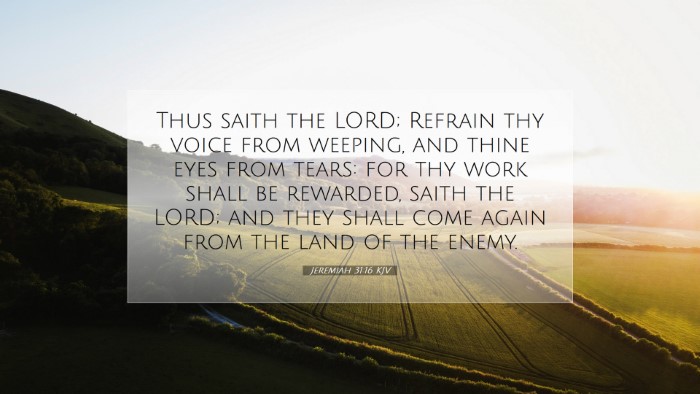Jeremiah 31:16 Commentary
Verse: "Thus saith the Lord; Refrain thy voice from weeping, and thine eyes from tears: for thy work shall be rewarded, saith the Lord; and they shall come again from the land of the enemy."
Introduction
The context of Jeremiah 31:16 lies within the broader narrative of God’s promise of restoration to His people. In the midst of exile and sorrow, God offers a message of hope. This verse illustrates a turning point—an assurance that their suffering will lead to rejoicing and that God’s faithfulness will prevail.
Exegesis of the Text
Jeremiah, known as the weeping prophet, conveyed profound emotions through his writings. This particular chapter stands out as a message of consolation, signaling a transition from lamentation to joy:
- Divine Command: "Refrain thy voice from weeping..." signifies God's command to cease mourning. The emotional outcry of the people is acknowledged yet directed towards a future filled with hope.
- Promise of Reward: "...for thy work shall be rewarded..." emphasizes God's justice. Their labor in suffering is not forgotten; a promise of restoration follows their trials.
- Return from Exile: "...they shall come again from the land of the enemy" foreshadows the restoration of Israel. This is not simply physical return but spiritual renewal—a central theme in the book of Jeremiah.
Theological Insights
Numerous public domain commentaries provide deep insights into the theological implications of this verse:
- Matthew Henry: Highlights how God encourages His people during their despondency. He points to the assurance of future blessing which stems from God's nature as a covenant-keeping God.
- Albert Barnes: Discusses the duality of immediate comfort and the yet-to-come fulfillment. Barnes notes the significance of hope amid despair, illustrating God’s promise as a catalyst for perseverance.
- Adam Clarke: Offers insights into the historical context, noting the pain of exile. He presents God’s promise as deeply rooted in divine compassion, with an emphasis on both physical and spiritual restoration.
Application for Today
This verse carries significant implications for contemporary readers, particularly for pastors, students, and theologians:
- Encouragement in Trials: Just as the Israelites were called to stop weeping, believers today are reminded of the transient nature of suffering. God’s promises should encourage a posture of hope and perseverance through adversity.
- Understanding Restoration: The promise of returning from exile can be viewed metaphorically for many. Believers often find themselves in spiritual deserts, and this verse serves as a reminder of God's restorative and redemptive plan.
- Call to Ministry: For pastors, this passage highlights the importance of communicating hope. Ministry often aims to encourage those who are hurting, echoing God’s assurance that suffering is not without purpose.
Conclusion
In summary, Jeremiah 31:16 encapsulates a profound message of hope. The transition from weeping to joy serves as a vivid reminder of God's unfailing promise to His people. By refraining from tears, the faithful are called to look forward to the redemption that God has assured them. As believers embody this hope today, they participate in a narrative of restoration that continues to unfold through faith and divine promise.


